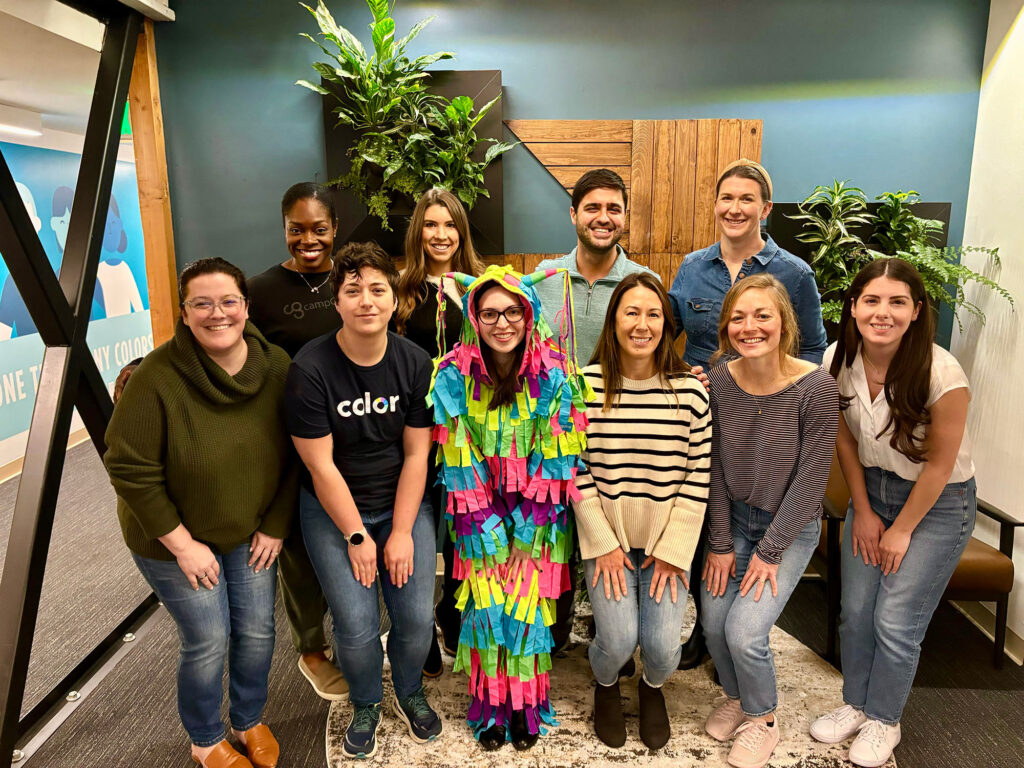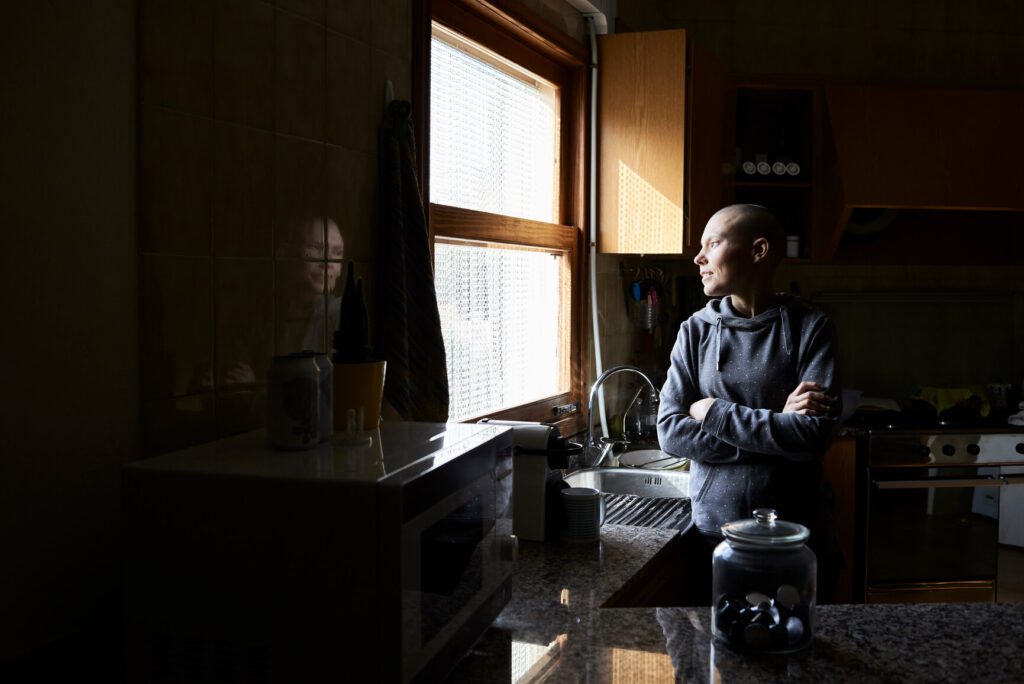News & Articles
Know Your Risk, Know to Take Action During Breast Cancer Awareness Month
Color

This year, an estimated 287,850 women will be diagnosed with breast cancer, making it the most common cancer in American women. Furthermore, recommended breast cancer screening through mammograms dropped nearly 80% at certain times throughout the pandemic according to the Journal of the National Cancer Institute, which could lead to a projected 2,487 additional deaths by 2030. It’s important to understand what actions you can take to determine if you are at an increased risk.
We asked Kelly Tangney, Head of Genetic Counseling Services at Color, and Keegan Duchicela, Head of Medical Affairs, to explain how Color’s genetic tests and Essential Care programs can arm you with vital information about your level of risk and direct you to appropriate care plans.
What can I do to assess whether I’m at increased risk of developing breast cancer?
There are many factors, like genetics and lifestyle, that can help you understand your cancer risk. Together, Color’s Hereditary Cancer Test and Essential Care programs offer a more holistic approach to assessing your risk for breast cancer.
Color offers clinical-grade genetic tests to individuals that can tell you about your hereditary risk for breast and other common cancers. Employers can offer the same genetic tests as a benefit to employees.
In addition to genetic testing, Color offers a comprehensive Essential Care benefit to employers that covers high burden conditions including cardiometabolic, mental health, and common cancers. This program evaluates whether individuals are up to date on their cancer screenings and tests for other conditions that increase your risk of developing cancer. When individuals are at an increased risk or are not up to date on screenings, our clinicians then guide them to the most appropriate screening options.
How does the Color genetic test detect risk of breast cancer?
We analyze several genes, made up of DNA, that credible research has proven are associated with breast cancer risk. Taking this test can help determine if you have an increased genetic risk, and what personalized next steps may be relevant such as engaging with your healthcare providers to prepare a personalized plan of action. The goal of the test is to identify people who are at higher risk so they can screen more often, start screenings at younger ages, or take measures to prevent breast cancer in the future.
And how about Essential Care? How does that assess my level of risk of breast cancer?
Our Essential Care program tests for other common conditions that can significantly increase your risk for breast cancer including high cholesterol, obesity, and to a lesser extent, diabetes. Early detection and intervention of these conditions will reduce the risk of breast cancer. With the Essential Care program, individuals can have discussions with a clinician about modifications in diet and exercise that will lower their overall risk of breast cancer.
Beyond this, our program provides an easy-to-complete questionnaire which helps individuals to determine whether they are up to date on their screenings. From there, our certified clinicians will then review the cancer screening guidelines that are recommended for you and suggest how to get the appropriate follow-up.
Can you develop breast cancer without a genetic risk?
Yes. There’s about a 13% chance that a woman will develop breast cancer over their life. However, only a small portion of them (5-10%) will have a gene mutation that also contributes to risk. There are also non-genetic factors, familial factors and possibly other genetic factors that are not as well defined that can all contribute to cancer risk. As we age our risk increases for cancer and other diseases. Things like diet, lifestyle, and environmental exposure can increase risk. That said, there’s still a lot of research to be done and a lot of awareness to be brought about. Hopefully we’ll make advances in the future that will further personalize someone’s cancer risk and lead to better personalized health outcomes.
How old should you be to get a genetic test?
The age at which someone decides to know their own risk depends on many factors — most notably about whether they are ready to know and act upon such critical information. These things are important to think through prior to testing. Some people as early as age 18 are ready to learn this information, especially if they have seen relatives undergo cancer treatment or already know of someone in the family who is at known risk. Some choose to wait until they are in their mid 20s, or at an age when there could be action they could take right away depending on the result. For example, for females assigned at birth with a BRCA1 or BRCA2 gene mutation, the recommended age to start breast cancer screening is 25 years old. Sometimes this information can be really helpful for reproductive decision making or family planning, as well.
Besides getting tested, what are preventive measures women can take?
Women without other risk factors should be having annual mammograms starting at age 40. For women who are identified with a higher risk of breast cancer, we might recommend breast MRIs, or starting screening at an earlier age.
For example, it is recommended to start screening for breast cancer at age 25 for someone who has a BRCA1 or BRCA2 mutation. There are also options available like medications and procedures that can help reduce risk for those who have been identified to have a higher hereditary risk.
Additionally, if you find that you have higher cholesterol, smoke, or have an elevated BMI, you should consider some lifestyle changes as these are all risk factors that may increase your risk of developing breast cancer.
Is it useful to take a genetic test or get evaluated for risk if you have no discernible signs of breast cancer in your family?
Absolutely. Personal and family health history do account for cancer risk, but it’s not everything. In the past many people in the medical and scientific community assumed we should only screen individuals with a strong family history of cancer. However, there is a lot of evidence, including our experience at Color, to show that people without family history — or those who don’t know their biological family history, or are adopted — can still come back with a positive finding. This can help prompt actionable, preventive steps to keep them healthy and inform other relatives.
In addition to looking at your genes, testing and screening for diabetes and high cholesterol is useful because oftentimes individuals don’t show visible signs for these conditions. Which is why screening for these conditions is also important as these can contribute to your risk for breast cancer.
Why is taking action sooner rather than later important?
With most cancers, you have a better survival rate when it’s caught earlier. With conditions like high cholesterol, diabetes, obesity, smoking, we know the risk accumulates over time– so earlier interventions can help mitigate risk for common cancers.
If there’s found to be a genetic component to your risk, your cancer risk will continue to increase as you get older whether you have a mutation or not, but knowing the information when you’re young and healthy can help determine longevity and health in future decades. There are medically-backed guidelines that show starting screening at an early age for some gene mutations can work to detect earlier stage cancers — which have greater survival rates and increased treatment options that are less invasive.
Also finding out about these gene mutations can impact the awareness and risk-knowledge in other relatives. By taking the Color genetic test you may not only learn about your own risk, but you could be helping other close relatives understand their risk and take action.
How will clinicians or counselors work with me to understand my results?
For those using our Essential Care program, licensed clinicians will review your results and discuss diet, exercise and other lifestyle modifications to reduce your risk for high-cholesterol, diabetes, and obesity. The clinicians will work with you to ensure you’re up to date with your screenings and then create an action plan that can connect you to other benefits offered through your employer to help manage conditions, or direct you to any recommended cancer screenings you may require.
And for those taking Color’s genetic test, a complimentary telephone genetic counseling session is available after your results are ready. In that session, our board-certified genetic counselors can walk through every aspect of your result as well as integrate health history and lifestyle factors to help you understand your personalized risk. We’re also here to help connect the dots with other healthcare providers based on the results to get you the care that you may need. Genetic counselors can be beneficial at any point during the testing process, too. Before even testing, genetic counselors can work with you to determine if it’s the right time to know this information and which tests may be best for you or your family.
Are Color tests affordable?
Color has tried to make testing as accessible and affordable as possible for all people. Years ago — in order to take genetic tests — most people would have had to pay thousands of dollars out of pocket. Insurers rarely paid for the test unless the person had a personal or an identifiable family history of certain cancers.
Similarly, we’ve reduced the barriers for basic healthcare services– our Essential Care programs are offered at 50-60% less than traditional providers. Together, these programs lower the barrier for people to get a more holistic view of their risks.
Looking to order your Color genetic test kit for yourself? Click Here.
Are you an employer interested in expanding access to essential care services? Click here.



